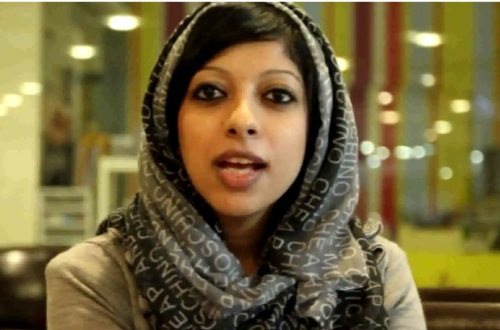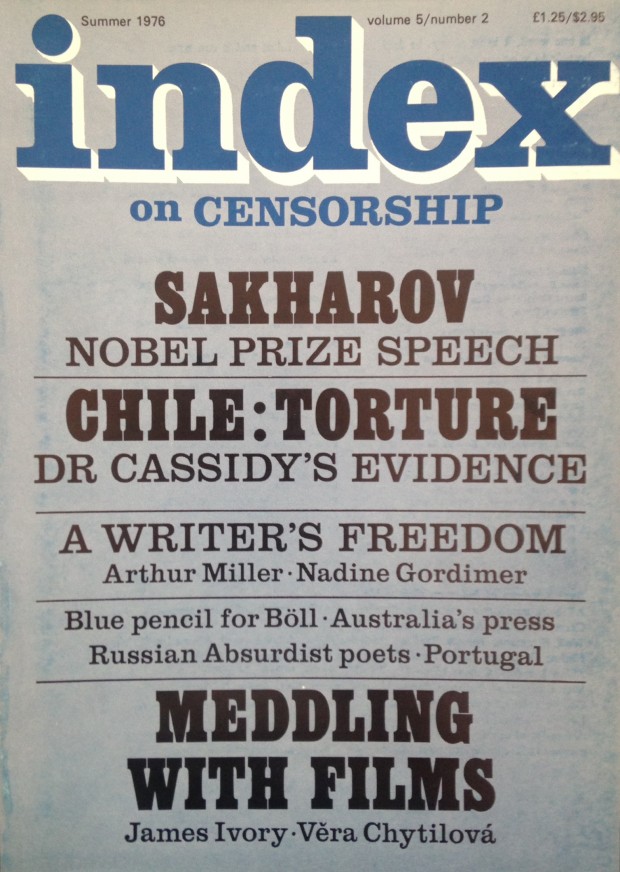19 Oct 2015 | Bahrain, mobile, News and features

Zainab al-Khawaja
Bahraini human rights activist Zainab Al-Khawaja will appear before the Bahraini court of appeals on 21 October to hear its verdict on charges including ripping a picture of and insulting the king, for which she has been on bail since 2014.
Al-Khawaja, the daughter of Abdulhadi Al-khawaja, former president of the Index award-winning Bahrain Centre for Human Rights, faces nearly five years in prison if her appeal is rejected. Al-Khawaja was sentenced on 4 December 2014 — just days after giving birth to her second child — on four charges which include two months for ripping the picture of the king, one year for insulting a police officer, three years for insulting the king and nine months for entering a restricted area.
The Al-Khawaja family have been involved in Bahrain’s pro-democracy movement, making them targets for authorities in the monarchy. Zainab Al-Khawaja’s father, Abdulhadi, was sentenced to life imprisonment on 22 June 2011 for his peaceful human rights activities. Zainab’s sister Maryam Al-Khawaja has been acting president of the Bahrain Centre for Human Rights since the arrest of Nabeel Rajab, another high-profile activist who has been subjected to judicial harassment for expressing opinions.
A Thunderclap campaign has been launched urging people to wish her a happy birthday and call for her conviction to be quashed so that she and her year-old son don’t go to prison.
Al-Khawaja has thanked supporters on Twitter, saying “My love and respect to all the people of Bahrain who continue to sacrifice every day so that someday our children can be free. And thank you to all those who stand up and speak out on behalf of the people of Bahrain. You restore our faith in humanity.”
19 Oct 2015 | Asia and Pacific, China, mobile, News and features

(Photo illustration: Shutterstock)
With UK-China relations warming, the president of the People’s Republic of China, Xi Jinping, will pay a state visit to the UK from 20-23 October. The UK government hopes the visit will help finalise multibillion-pound deals for Chinese state-owned companies to contribute to the building of two British nuclear power plants.
Many — including the Dalai Lama — are concerned that Prime Minister David Cameron and Chancellor George Osborne are putting the desire for profit above concern for human rights.
Xi may be staying in luxury at Buckingham Palace during his visit, but here are just five examples of how respect for free speech in China doesn’t get past the front door:
1. Locking up artists
The soccer-loving Chinese president is due to visit Manchester City Football Club’s stadium with Cameron during his visit. But will he make time for the new exhibition by Chinese artist and dissident Ai Weiwei in London? We won’t hold our breath.
The major retrospective of the artist’s work is currently on show at the Royal Academy of Arts. Ai — whose work is famous for addressing human rights abuses and corruption — has been harassed, beaten, placed under house arrest and imprisoned.
The current London exhibition almost didn’t go ahead as the British Embassy in Beijing turned down Ai’s request for a business visa in connection with his criminal conviction for tax fraud — an accusation he denies. British Home Secretary Theresa May eventually overturned the embassy’s decision, but only after a mass public outcry. This shouldn’t be the height of the British government’s efforts to address Chinese human rights abuses.
2. The use of online “opinion monitors”
China’s Terracotta Army, the 8,000-strong force of sculptures depicting warriors and horses, was purpose-built to protect emperor Qin Shi Huang, who died in 210 BC, in his afterlife. In the modern day, China’s army of “opinion monitors”, which has been purpose-built to protect China’s current leaders from criticism and dissent, dwarfs anything the Qin dynasty could muster.
Last year, Index on Censorship reported that the Chinese government is expanding its censorship and monitoring of web activity with a new training programme for an estimated two million flies on the firewall.
China’s hundreds of millions of web users increasingly use blogs to condemn the state, but posts are routinely deleted by government employees. In 2012, monitors banned more than 100 search terms relating to the 25th anniversary of the Tiananmen Square protest of 1989 and even shut down Google services.
3. Banning books
Often overshadowed by China’s internet censorship, we shouldn’t forget that Chinese authorities have a rich history of restricting free expression in literature. In 1931, Lewis Carroll’s Alice’s Adventures in Wonderland was banned for its portrayal of anthropomorphised animals for fear children would regard humans and animals as equal. During Chairman Mao Zedong’s Cultural Revolution, all aspects of arts and culture had to promote and aid the revolution. Libraries full of historical and foreign texts were destroyed and books deemed undesirable were burned.
The country’s post-Mao transition has been marked by a commitment to “modernising”. While the Chinese populace has access to more information than ever before, their leaders’ continuation of banning books on grounds of non-conformity and deviance are anything but modern.
Publications which are still banned — often for perceived politically incorrect content — include the memoirs of Li Rui, a retired Chinese politician and dissident who caused a stir in the CCP by calling for political reform; Lung Ying-tai’s Big River, Big Sea about the Chinese Civil War; and Jung Chang’s best-selling Wild Swans, a history that spans a century, recounting the lives of three female generations in the author’s family.
4. Detaining activists
Recent years have been marked with an intensification of the crackdown on dissent. On 6 March 2015, just days before International Women’s Day, the Chinese government detained a number of high-profile feminist activists. They were accused of creating a disturbance and, if convicted, could have received three-year prison sentences.
The women had been linked to several actions over the years which highlight issues such as domestic violence and the poor provision of women’s toilets, obvious embarrassments to the authorities.
As a result of their detention, China’s small, but increasingly vocal feminist movement was dealt a heavy blow. Demonstrations were cancelled and debate was effectively silenced. Five of the activists were released fairly quickly, but five more were in prison until 13 April, with two being denied treatment for serious medical conditions while in custody.
5. Repressing Uyghur Muslims
China continues to persecute the largely Muslim minority Uyghurs of Xinjiang. A tough system of policies and regulations deny Uyghurs religious freedom and by extension freedom of expression, association and assembly.
The abuse of national security and anti-terror laws to persecute Uyghurs and further deny them freedom of expression was highlighted in the recent ban by the Chinese authorities on 22 Muslim names in Xinjiang in an apparent attempt to discourage extremism among the region’s Uyghur residents. Many children were barred from attending school unless their names were changed.
Ryan McChrystal is the assistant online editor at Index on Censorship
18 Oct 2015 | About Index, Campaigns, Mapping Media Freedom, Press Releases, Statements, Turkey, Turkey Statements
Concern over the deteriorating state of press freedom in Turkey and its impact on upcoming Nov. 1 parliamentary elections have prompted a coalition of international free expression groups to undertake an emergency press freedom mission to the country, the International Press Institute (IPI) announced.
From Oct. 19 to 21, mission participants will meet in Istanbul and Ankara with journalists, political representatives and foreign diplomats to demonstrate solidarity with their colleagues in the news media and to focus attention in Turkey and abroad on the impact the growing pressure on independent media is likely to have on the election.
The unprecedented mission will bring together representatives from eight leading international press freedom and free expression groups, including IPI, the Committee to Protect Journalists (CPJ), Reporters Without Borders (RSF), the International Federation of Journalists (IFJ), the European Federation of Journalists, Article 19, Index on Censorship and the Ethical Journalism Network.
The mission will conclude with a press conference at 13:00 on Oct. 21 at the offices of the Journalists Association of Turkey (TGC), at Türkocağı Cad. No: 1, Cağaloğlu, Istanbul.
Since late August, when President Recep Tayyip Erdoğan called a repeat of June elections after lawmakers were unable to form a government, Turkey has witnessed a series of increasingly troubling incidents targeting journalists and media. Among others, they include physical attacks on journalists and media outlets; raids on media outlets and seizures of publications; threatening rhetoric directed at journalists; and the increasing use of criminal insult and anti-terrorism laws to chill independent reporting.
Next week’s mission will focus on these incidents, as well as the ongoing imprisonment of numerous journalists in Turkey and the deportations of foreign journalists, particularly those
attempting to cover deadly clashes with the outlawed Kurdistan’s Workers Party (PKK) and Turkey’s participation in the international fight against the Islamic State group.
The mission comes as satellite and online television providers have accepted prosecutors’ demands to stop carrying the signals of broadcasters critical of the government.
“The upcoming election is likely to decide Turkey’s direction for the coming decade and its outcome will have far-reaching implications for Turkey, its neighbours, the West and the wider world,” IPI Executive Director Barbara Trionfi said. “IPI and its partners are undertaking this emergency press freedom mission to Turkey to stand in solidarity with our colleagues under pressure, and to demand that voters be allowed to make an informed decision about their future and that the media be allowed to report freely to give voters the information they need to do so.”
The deterioration of press freedom in Turkey represents the culmination of a years-long trend documented earlier this year in an IPI Special Report on the country, “Democracy at Risk” (also available in Turkish).
For more information about the Oct. 21 Press Conference at 13:00, please contact the Journalists Association of Turkey (TGC) by telephone at +90 (0 212) 513 83 00 or via email at [email protected].
16 Oct 2015 | Magazine, mobile, Student Reading Lists

Summer 1976 magazine cover, featuring Arthur Miller
US playwright Arthur Miller, author of Death of a Salesman and The Crucible, was born 100 years ago on Saturday 17 October. To mark the occasion, Index on Censorship has compiled a reading list of Miller’s articles in our magazine. The content has been released from behind the paywall until 23 October. To explore the full archives, subscribe here. Other great playwrights who have written for Index include Samuel Beckett, Harold Pinter, Wole Soyinka and Sir Tom Stoppard.
The sin of power
“The sin of power is to not only distort reality but to convince people that the false is true, and that what is happening is only an invention of enemies.” September 2012 vol. 41 no. 3 173-180
A kind of despair
“The problem, I think, is that people’s faces don’t change simply because their country is being crushed in all but name and geographical boundaries; they just go on looking disconcertingly like people.” December 1981 vol. 10 no. 6 31-32
An enemy of the people
An extract from Arthur Miller’s 1950 adaptation of Henrik Ibsen’s An Enemy of the People. July 1989 vol. 18 no. 6-7 75-76
After Helsinki…
“I had a drink one night in a Czech writer’s home with five or six of his colleagues present, when his teenage son looked out the window and saw an unmarked car drive up with plainclothesmen in it; they simply sat there silently warning my host that he was driving another nail into his coffin.” June 20, 1976 vol. 5 no. 2 23-26



